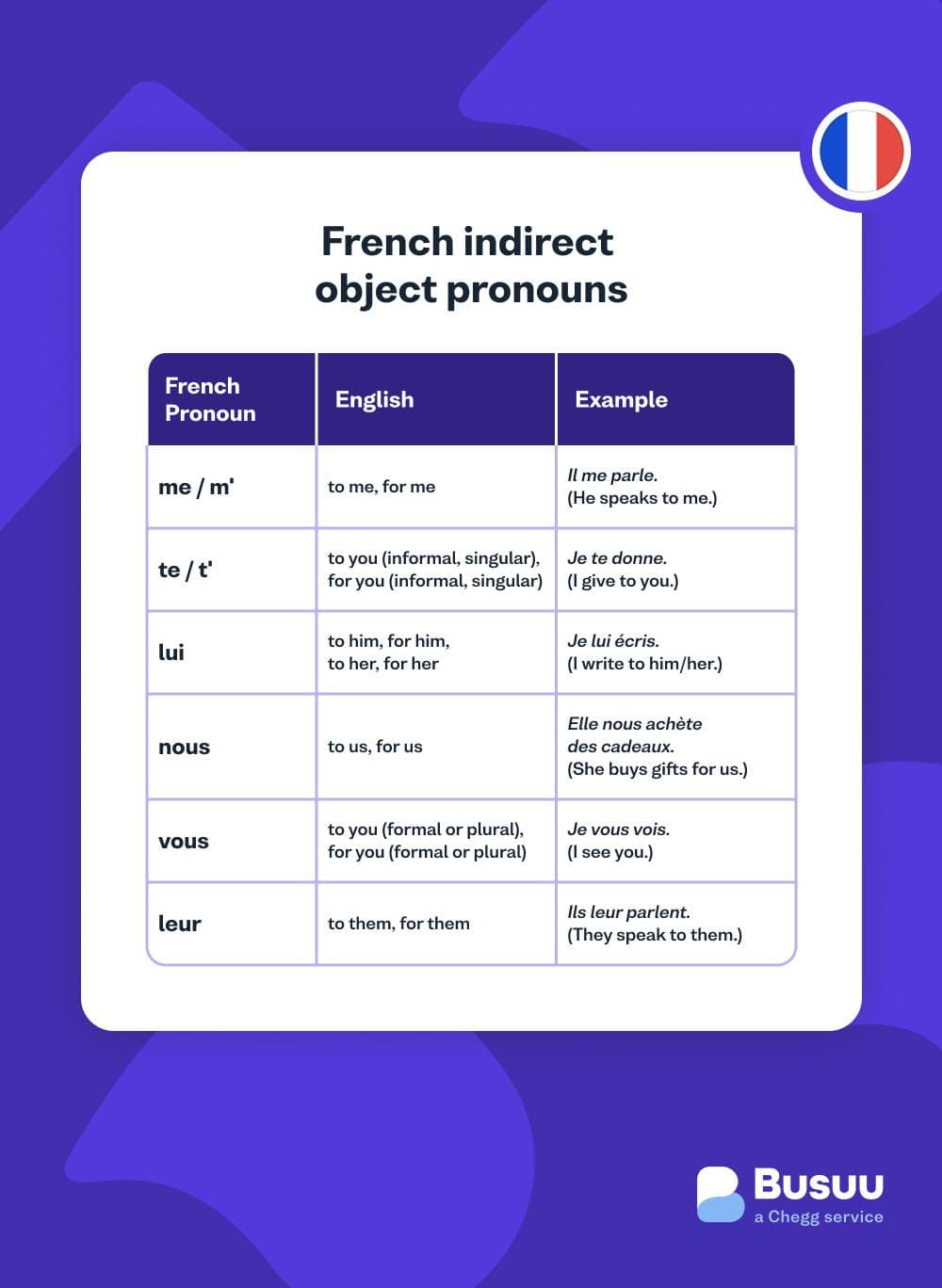I want to learn...
Indirect object pronouns are words that replace the nouns which are the indirect object of a sentence. In French, indirect objects are the people in a sentence to whom an action happens indirectly. In other words, they receive the action of a verb.
Throughout this article, we will explore the various forms and functions of French indirect object pronouns, equipping you with the knowledge and skills needed to use them effectively in your French communication and conversation.
Ready to learn? C'est parti ! (Let's go!)
Identifying the indirect object in a sentence
In French, an indirect object is usually introduced by the preposition "à". You can identify an indirect object by asking the question "to whom" or "for whom" the action happens to.
For example, in the sentence, "Je donne le livre à Pierre" (I give the book to Pierre), Pierre is the indirect object of the verb donne (give) because he is the one to whom the book is given.
In another example, "Il écrit une lettre à son ami" (He writes a letter to his friend), son ami is the indirect object of the verb écrit (writes). The letter is being written for his friend. So, son ami is the person for whom the action of writing is done.
Sometimes the preposition "à" is built into the verb, like in répondre à (to answer), obéir à (to obey), parler à (to speak to), etc. In sentences with these verbs, the object following the verb is also an indirect object.
For example, "J'obé is à mes parents" (I obey my parents). Here mes parents is the indirect object. Below is a table of French indirect object pronouns:

French indirect object pronouns
| French Pronoun | English | Example |
|---|---|---|
| me / m' | to me, for me | Il me parle. (He speaks to me.) |
| te / t' | to you (informal, singular), for you (informal, singular) | Je te donne. (I give to you.) |
| lui | to him, for him, to her, for her | Je lui écris. (I write to him/her.) |
| nous | to us, for us | Elle nous achète des cadeaux. (She buys gifts for us.) |
| vous | to you (formal or plural), for you (formal or plural) | Je vous vois. (I see you.) |
| leur | to them, for them | Ils leur parlent. (They speak to them.) |
Rules about the position of indirect object pronouns
In French sentences, the indirect object pronoun usually comes before the verb. This applies in all tenses and moods, including the infinitive and present participle, with very few exceptions.
1. Basic rule
In French, the indirect object pronoun comes before the verb.
For example: "Elle me parle" (She speaks to me).
2. In negative sentences
The indirect object pronoun still comes before the verb, placed between ne and the verb.
For example: "Je ne lui parle pas" (I don't speak to him/her).
3. With compound tenses (like passé composé)
With compound tenses, the indirect object pronoun goes before the auxiliary verb.
For example: "Je lui ai parlé" (I spoke to him/her).
Here the indirect object lui comes before the auxiliary verb avoir.
4. With infinitives
When the sentence contains an infinitive, the indirect object pronoun goes before the infinitive, not the conjugated verb.
For example: "Je vais lui parler" (I'm going to speak to him/her).
5. In questions
The indirect object pronoun still comes before the verb.
For example: "Lui parles-tu?" (Do you speak to him/her?).
The order of object pronouns when more than one is used in a sentence
When you use more than one pronoun in a sentence, there is a specific order to follow.
Here's the order:
Me, Te, Nous, Vous
Le, La, Les
Lui, Leur
Y
En
So if we were to combine two pronouns, we would follow the order above.
●Example 1:"Je te le donne." (I give it to you.)
= > Here, te (you) comes before le (it).
●Example 2:"Je vais lui en parler." (I'm going to speak to him/her about it.)
= > Here, lui (him/her) comes before en (about it).
Indirect object pronouns y and en
The indirect object pronouns y and en hold special places in French grammar. These pronouns do not have an exact English translation, but their use case is pretty straightforward.
The pronoun y
The pronoun y generally means "there", and replaces a previously mentioned place. It replaces a noun introduced by à (to/at), dans (in), chez (at the house of), sous (under), sur (on), and other prepositions for places.
● Example 1: "Tu vas à la plage?" "Oui, j'y vais." (Are you going to the beach? Yes, I'm going there.)
● Example 2: "Nous pensons souvent à Paris." "Nous y pensons souvent." (We often think about Paris. We often think about it.)
The pronoun en
The pronoun en in French replaces a partitive article (du, de la, de l', des) + noun, an indefinite article (un, une, des) + noun, or a noun following a number. It generally means "some", "any", or "of it".
●Example 1: "Tu veux du café?" "Oui, j'en veux." (Do you want some coffee? Yes, I want some.)
●Example 2: "J'ai trois frères." "J'en ai trois." (I have three brothers. I have three of them.)
The pronouns y and en make your French sound more natural by avoiding the repetition of places and quantity.
French indirect object pronouns: Recap
Understanding indirect object pronouns in French significantly enhances your fluency. These pronouns help streamline sentences and avoid repetition. In other words they help the conversation flow.
To identify the indirect object in a sentence, it helps to ask "to/for whom?" or "to/for what?" after the verb.
When multiple object pronouns are used in a sentence, they follow a specific order: me, te, nous, vous; le, la, les; lui, leur; y; en.
French indirect object pronouns become second nature with practice. Remember to review and practice often to gain confidence in your French grammar. You got this!
Newlanguages


